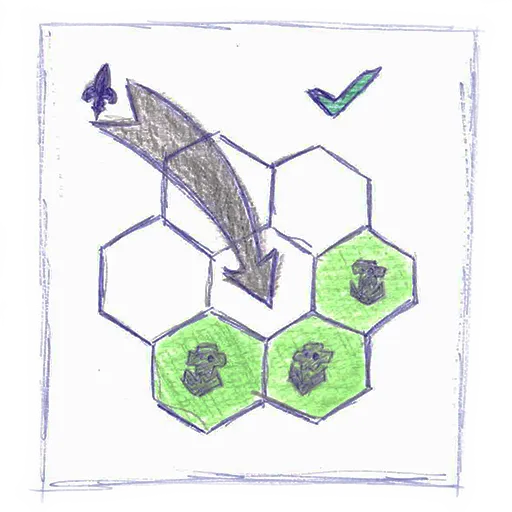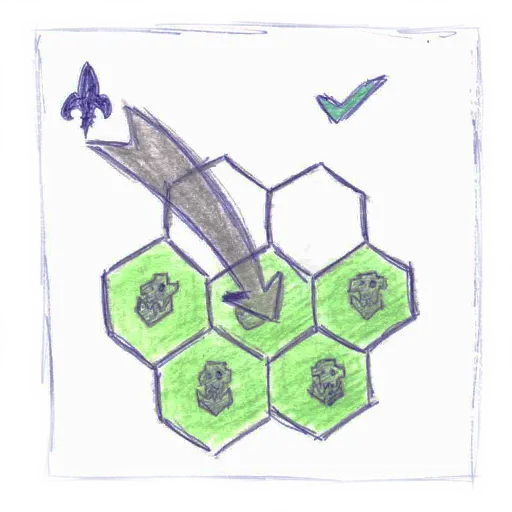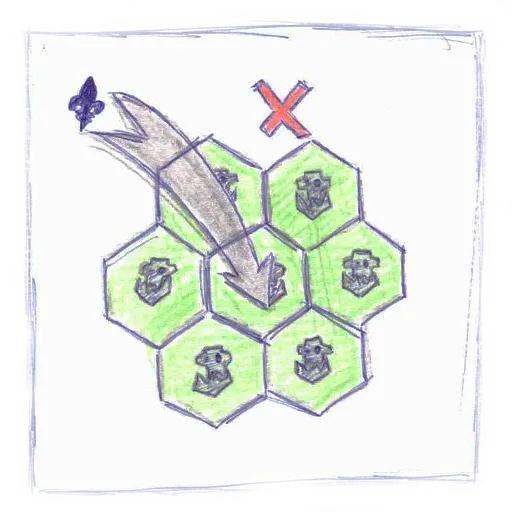Game Rules
1. Presentation and Concept
Welcome to 40k.gg, the first interactive, real-time and massively multiplayer narrative campaign for Warhammer 40,000.
Each battle against your friends or competitive opponents contributes to deciding the fate of Morologus Novem. If you want to learn more about the history of this campaign, check out the Lore.
The principle is simple: at any time, you can invite an opponent and anchor your Warhammer 40,000 game in the 40k.gg campaign; the outcome of your battle will determine which faction gains control of a zone on the interactive map.
The campaign will conclude once all its successive chapters are complete, and the faction controlling the most zones on the map will be declared the winner. However, be cautious as disasters can disrupt your plans, and random events can temporarily advantage or disadvantage factions (see sections "4.a Meta Management" and "4.b Random Events" for more information).
2. How to play
The narrative campaign is presented as a "meta-game," meaning a set of features encompassing your Warhammer 40,000 games in a broader context, but do not alter the rules of the Warhammer 40,000 game in any way. Essentially, it acts as a "superset" around your board game.
When you agree to play a game of Warhammer 40,000 with an opponent, you can log in to your user account on 40k.gg, and then:
- Choose a zone for the battle: This step can be strategically important for your faction, as the more contiguous zones you control, the more challenging it becomes for your opponents to contest them. Refer to the section "2.a Eligibility for Zone Reservation" for more information.
- Invite your opponent: Once you have reserved the zone, you receive an invitation code to share with your opponent. Consult the section "2.b Invite your opponent" for more details on the invitation system.
- Update the result: Once you finished your game of Warhammer 40,000, you (and only you, as the host) must indicate on 40k.gg who won the game. The outcome of your game determines which faction controls the contested zone. Read the section "2.c Reporting the Result" for more information.
a. Eligibility for Zone Reservation
When participating in this narrative campaign, an important aspect is the choice of the zone to contest, in the hope to gain control of that zone with your faction. However, some conditions and constraints govern your options.
Thus, you can only select a zone for a battle if you meet the following criteria:
- Not engaged in any other battle: You can choose a zone for your upcoming battle only if you are not already involved in another game, even if your invitation to another opponent has not been accepted yet.
- No more than 3 battles per day: You can only report up to 3 matches within a 24-hour period. This is an anti-abuse measure.
- Your account has not been blocked: Like any massively multiplayer game, various mechanisms have been implemented to detect and counter attempts to manipulate trends. If the system determines that your account has engaged in multiple behaviours deemed suspicious, it may be blocked. Refer to the section "3. Anti-Game and Sanctions" for more information.
Additionally, as mentioned earlier, there are circumstances in which a zone is inaccessible to your faction. Therefore, you can only reserve a zone that meets the following conditions:
- The zone is available: The zone is not already reserved for another battle. A zone can be locked as "reserved" for up to 24 consecutive hours before being automatically released (see sections "2.b Invite your opponent" and "2.c Reporting the Result" for more information on this duration).
- The zone is not already controlled by your faction: You cannot contest a zone if it is already controlled by your own faction or a directly allied faction. For example, if you play the Sisters of Battle, you cannot attempt to contest a zone controlled by the Imperial Guard.
- The zone is neutral...: The zone is currently not under the control of any faction,
- ... OR a neighbouring zone is neutral or controlled by your faction: The zone is controlled by an enemy faction to yours but a directly adjacent zone is neutral or controlled by your faction or an allied one.

fig. 1 - A Sisters of Battle player wants to attack the zone in the middle; it is neutral, so they can proceed.

fig. 2 - The Sororita player wants to attack a zone that is currently held by the Orks; as it is bordered by at least 1 neutral zone, they can proceed.

fig. 3 - The Sororita player cannot attack the zone in the middle, because that zone and all the others around are held by the Orks.
⚠️ Special rule "Dropping-in Hot!": If all the zones are at some point controlled by all factions but one, it would mean that faction is locked out of the game. To allow it to get back to the game, this "left out" faction is allowed to attack any zone.
Once you have determined the zone to "anchor" your upcoming battle, you can click the "Conquer" button. Note that if you have set several factions in your account, you will have to choose from the eligible factions according to the conditions detailed above.
b. Invite your opponent
Once you have reserved the zone for your battle, you will receive an invitation; you must send it to your opponent so they can confirm it. This invitation is a URL link you can copy/paste or share with your opponent; it also appears as a QR code that your opponent can scan with their mobile devices.
You can always find this invitation link and QR code from your notification centre on 40k.gg.
Important: Once the zone is reserved, you must get your opponent to confirm it under 12 hours; otherwise, your battle on 40k.gg will be cancelled. This time constraint aims to limit attempts at abuse or manipulation.
An account that repeatedly reserves zones without validating invitations or cancels them could be blocked. Refer to the section "3. Anti-Game and Sanctions" for more information.
You will receive a notification in your notification centre once your opponent confirms their participation.
c. Reporting the Result
Once you have completed your game of Warhammer 40,000 against your opponent and a winner has been determined, you must report it. To do so, a notification allows you to access the result reporting screen in your notification centre.
Important: You have 12 hours from the moment your opponent confirms the invitation to report the result of your game; otherwise, your battle on 40k.gg will be canceled. This time constraint aims to limit attempts at abuse or manipulation.
After this action, the status of the zone can change in different ways:
- If the zone was neutral, the faction that won the game gains control of the zone.
- If the zone was not neutral, but at the time of reporting the result, at least one adjacent zone is controlled by the winning faction or an allied faction, the winner of the game gains control of the zone.
- If the zone was not neutral, and at the time of reporting the result, no neighboring zone is controlled by either the winning faction or an allied faction, then the zone becomes neutral.
Your opponent will be able to dispute the result for the next 24 hours after you reported the outcome if they believe it is incorrect, which will cancel the battle. However, repeated disputes can lead to an account block for both the host and the guest. Refer to the section "3. Anti-Game and Sanctions" for more information.
3. Anti-Game and Sanctions
As this narrative campaign is freely accessible at any time, the system considers the risks of attempting to manipulate and abuse the features. The following anti-game behaviours are not allowed:
- No multi-accounts: One player is prohibited from creating multiple accounts, regardless of the reason. Consequently, the system prevents the creation of user accounts with disposable email addresses or multiple accounts with different aliases from the same email address.
- No excessive zone blocking: Repeatedly reserving zones without getting the invitations confirmed or not reporting results is prohibited. Indeed, reserving a zone blocks it for a period that can extend to 24 hours, during which no other participant can intervene on it; abusing this mechanic without actually playing is considered anti-game behaviour.
- No repeated result disputes: As a host, reporting results frequently disputed by your opponents is considered a potentially anti-game tactic. Similarly, as a guest, disputing the outcome of your battles too regularly can be seen as an attempt to abuse the system.
Detection of these behaviours results in the automatic and permanent blocking of the implicated accounts. A blocked account can log in but not participate in any games as a host or guest.
Please note that moderators and administrators of 40k.gg can also block accounts that they consider to be engaging in anti-game behaviours, even if these behaviours are not explicitly listed above.
4. Compensations & Random Events
Not all factions of Warhammer 40,000 benefit from the same popularity. Therefore, some factions, such as those of the Imperium, will be more represented on 40k.gg than other more marginal factions, such as the Leagues of Votann. For this reason, the game provides "compensatory mechanisms" to balance the gaming experience for everyone.
a. Meta Management
The inequality in faction representation could lead to less-played factions becoming unable to participate, such as when no zone remains neutral or controlled by a faction or its allies.
Therefore, it is established that the most played factions will periodically lose a few zones proportional to their overrepresentation; these zones will become neutral.
A faction's representation will be calculated based on the number of battles it is involved in, the frequency of these battles, and the number of participants playing it.
This compensatory effect is not intended to reverse trends, and its impact will remain limited.
b. Random Events
The game will periodically introduce disruptive elements to provide an evolving and entertaining experience; their nature will be revealed as the campaign's story unfolds.
5. Party System
The Party System allows you to create a group of players to coordinate your efforts in the campaign. This feature is particularly useful for playing with friends or organizing club events while maintaining the same rules and constraints as regular battles.
a. How Parties Work
Any registered player can create a party and invite other registered players to join. By default, the player who creates the party is designated party leader. They gain additional capabilities to manage battles on behalf of party members. Leadership of a party can be transferred to another active member of the party.
b. Party Leader Abilities
As a party leader, you can:
- Set up battles for any party member: You can reserve zones and create battle invitations in the name of any player in your party, including yourself.
- Assign host and guest roles: When creating a battle, you decide which party member will be the host and which will be the guest.
- Report battle results: You are responsible for reporting the outcome of battles involving your party members.
c. Important Constraints
Players in a party remain subject to the same limitations as in regular battles:
- All eligibility rules apply: Zone reservation requirements, the 3-battles-per-day limit, and neighbouring zone constraints still apply to each individual player.
- One active party at a time: A player can only be a member of one active party at any given time. This limitation is designed to prevent attempts to exploit the party system for unfair advantages.
- Anti-game rules still apply: The same sanctions for suspicious behaviour, excessive zone blocking, and result disputes apply to party members and leaders.